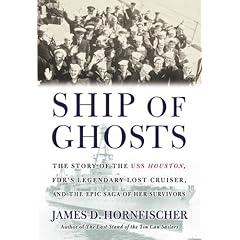Book Report: “Ship of Ghosts”
James Hornfischer’s second work is a wonderful a read as his first, “Last Stand of the Tin Can Sailors,” which I discussed in this post.

“Ship of Ghosts” tells the story of the history of the USS HOUSTON (CA-30), from her time as the Flagship of the Asiatic Fleet to her loss in combat action, which is a remarkable tale in itself, then proceeds to document the life of the survivors, captured by the Japanese, to become the slave labor, intermingled with Japanese engineers, natives, Australian, British, and Dutch POWs that built the Thai-Burma railroad. Once captured, the crew of the HOUSTON had their lives intertwined with the crew of the RMAS PERTH, which was in company with and fought alongside HOUSTON, suffering the same fate, and the “Lost Battalion,” an Army National Guard form Texas (2 Bn/131 Regiment of the 36th Div). It is a story that sheds the light of truth on combat actions not well told before, but possibly more importantly, the actual conditions and situations that existed in the building of the Japanese railroad, dispelling the myths from “The Bridge Over the River Kwai” and “King Rat.”There is heroism, courage, determination, persistence, and sheer guts displayed on almost every page. The range of personal accounts, from the most junior to the most senior involved in this history are remarkable. The writing is, as in his last book, engaging and draws you into the story.I began reading this as the crisis of the British sailors and Marines was occurring a few weeks ago, and found the stories of how POWs handled their captivity at opposite ends of the spectrum of military character.The stories of the naval battles, between the massive Japanese Fleet and it’s supporting Imperial Army and Naval air forces and a out-numbered set of surface vessels from several allied nations trying to do their best to hold the Japanese back with out the luxury of air support, dedicated port facilities of logistical support. Some insight into the tactics used by both sides are discussed, useful to historians of Naval Warfare.Within the book are many stories with in the story, or natives who assisted the Allied prisoners, the medical conditions and how they were handled in the deep jungle under extreme circumstances, the Japanese freighters, carrying POWs to mainland Japan being sunk by US submarines and stories of US POWs who worked in the shipyards and factories of the Japanese.An interesting historical note is when the HOUSTON was sunk, the citizens of the Houston, TX area collected money to buy a new USS HOUSTON. The money ($34M) was sent to the War Department and not only funded a new light cruiser, but also money to build an escort carrier, the USS SAN JACINTO (CVL-30). This was the CVL that President George H.W. Bush flew from when he was bombing Chi Chi Jima and was shot down.
Not only did the Texans open their wallets, but they had a recruiting drive and more than 3000 men stepped forward to join the armed services to replace the lost 1,168 crewmen of the HOUSTON.
As the book works it’s way to it’s conclusion, there is information of the War Tribunals for those in the Japanese chain of command.
Well worth the time to read this well researched work.
Additional Notes:
- A blog for the USS HOUSTON (CA-30) is here.
- Notes on a dive on the USS HOUSTON by the son of a survivor.
Tracked back @: Yankee Sailor, Third World County
Categories: Army, Book Reports, History, Leadership, Marines, Military, Military History, Navy
